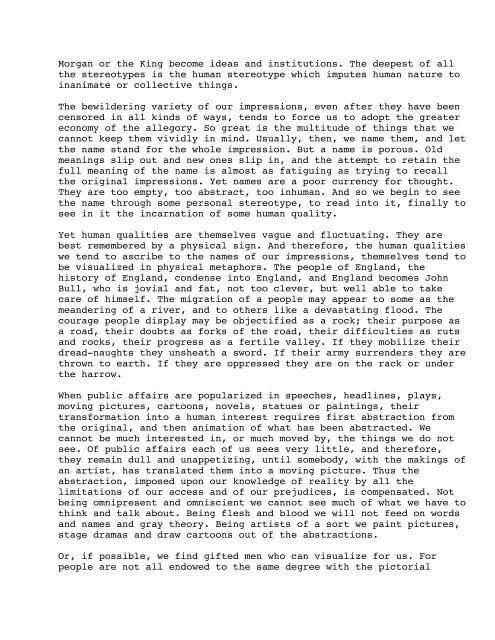PUBLIC OPINION by WALTER LIPPMANN TO FAYE LIPPMANN ...
PUBLIC OPINION by WALTER LIPPMANN TO FAYE LIPPMANN ...
PUBLIC OPINION by WALTER LIPPMANN TO FAYE LIPPMANN ...
Create successful ePaper yourself
Turn your PDF publications into a flip-book with our unique Google optimized e-Paper software.
Morgan or the King become ideas and institutions. The deepest of all<br />
the stereotypes is the human stereotype which imputes human nature to<br />
inanimate or collective things.<br />
The bewildering variety of our impressions, even after they have been<br />
censored in all kinds of ways, tends to force us to adopt the greater<br />
economy of the allegory. So great is the multitude of things that we<br />
cannot keep them vividly in mind. Usually, then, we name them, and let<br />
the name stand for the whole impression. But a name is porous. Old<br />
meanings slip out and new ones slip in, and the attempt to retain the<br />
full meaning of the name is almost as fatiguing as trying to recall<br />
the original impressions. Yet names are a poor currency for thought.<br />
They are too empty, too abstract, too inhuman. And so we begin to see<br />
the name through some personal stereotype, to read into it, finally to<br />
see in it the incarnation of some human quality.<br />
Yet human qualities are themselves vague and fluctuating. They are<br />
best remembered <strong>by</strong> a physical sign. And therefore, the human qualities<br />
we tend to ascribe to the names of our impressions, themselves tend to<br />
be visualized in physical metaphors. The people of England, the<br />
history of England, condense into England, and England becomes John<br />
Bull, who is jovial and fat, not too clever, but well able to take<br />
care of himself. The migration of a people may appear to some as the<br />
meandering of a river, and to others like a devastating flood. The<br />
courage people display may be objectified as a rock; their purpose as<br />
a road, their doubts as forks of the road, their difficulties as ruts<br />
and rocks, their progress as a fertile valley. If they mobilize their<br />
dread-naughts they unsheath a sword. If their army surrenders they are<br />
thrown to earth. If they are oppressed they are on the rack or under<br />
the harrow.<br />
When public affairs are popularized in speeches, headlines, plays,<br />
moving pictures, cartoons, novels, statues or paintings, their<br />
transformation into a human interest requires first abstraction from<br />
the original, and then animation of what has been abstracted. We<br />
cannot be much interested in, or much moved <strong>by</strong>, the things we do not<br />
see. Of public affairs each of us sees very little, and therefore,<br />
they remain dull and unappetizing, until somebody, with the makings of<br />
an artist, has translated them into a moving picture. Thus the<br />
abstraction, imposed upon our knowledge of reality <strong>by</strong> all the<br />
limitations of our access and of our prejudices, is compensated. Not<br />
being omnipresent and omniscient we cannot see much of what we have to<br />
think and talk about. Being flesh and blood we will not feed on words<br />
and names and gray theory. Being artists of a sort we paint pictures,<br />
stage dramas and draw cartoons out of the abstractions.<br />
Or, if possible, we find gifted men who can visualize for us. For<br />
people are not all endowed to the same degree with the pictorial





